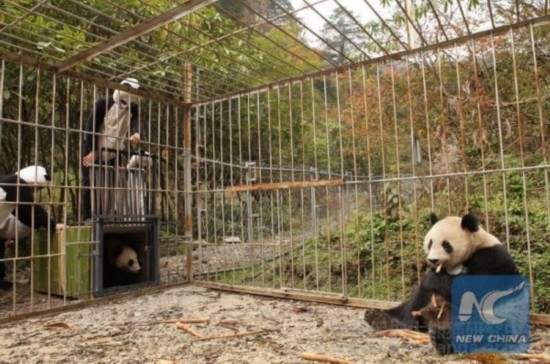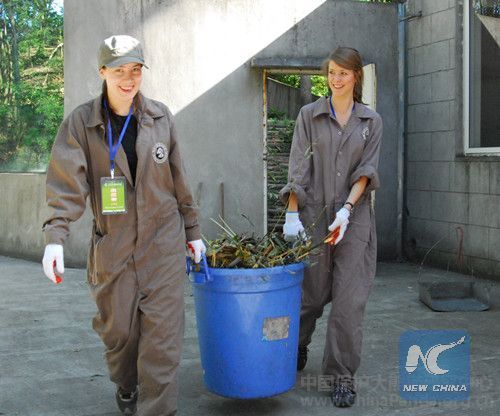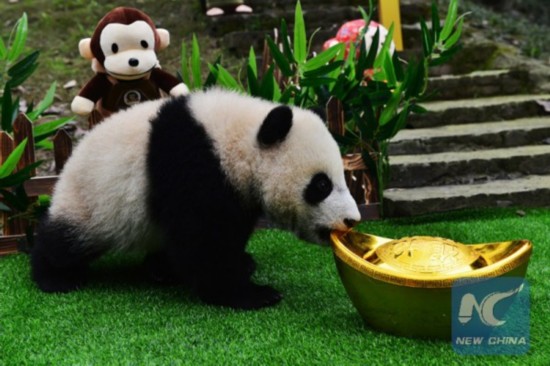


"Besides sleeping, the panda cubs love to play with each other. I play with them, too," Duan said. "They weigh over 10kg each and I can only hold one. They also bite with their teeth. It can be hurtful but does no harm."
Panda cubs are sentimentally attaching to their keepers. After spending some time together, they would get familiar with the keepers' voice and make every effort to invite them to hang out with them, sometimes hugging them and clinging to their legs.

But those who want to be a panda keeper have to be reminded that these energetic little creatures are also vulnerable.
Those who look after panda cubs under one year old will have to wear disinfectant suit and shoe covers before approaching the pandas. Also, the caretakers should prevent badly behaving tourists from throwing items at those panda cubs.
Moreover, the pay is decent. The center once ran a job ad in 2014 offering 200,000 yuan (31,000 U.S. dollars) a year for a panda caretaker who can both help take care of the pandas and better public promotion for the center. The position would enjoy free meals, transit and accommodations.

To be a keeper requires hard work and professional knowledge. However, it' s not necessarily the only way to staying with pandas. Every year, the center recruits volunteers from around the world. Filling in an application form on the official website, those successful applicants can work for a couple of days or several months.
Properly guided by professional caretakers, volunteers will be able to make food for and feed the pandas, clean their beds and learn knowledge about how to protect the rare species. Many foreign volunteers have fulfilled their duties well at the center.
Those overseas volunteers unable to come to China may also have opportunities to contribute to the protection of pandas globally since China has sent pandas to several foreign countries. At Zoo Negara Malaysia, for example, three young women became one-day "nannies" of the two pandas there this month.
 |
 Beijing Style: ready for bare legs
Beijing Style: ready for bare legs Top 10 Asian beauties in 2016
Top 10 Asian beauties in 2016 Amazing scenery of Xisha Islands
Amazing scenery of Xisha Islands Enthusiasts perform Kung Fu at Wudang Mountain
Enthusiasts perform Kung Fu at Wudang Mountain Stunning photos of China's fighter jets in drill
Stunning photos of China's fighter jets in drill Old photos record the change of Sichuan over a century
Old photos record the change of Sichuan over a century Asia's longest and highest suspension bridge to open to traffic
Asia's longest and highest suspension bridge to open to traffic China's first interactive robot looks like a beauty
China's first interactive robot looks like a beauty Vietnamese Su-30 fighters fly over Nanwei Island in South China Sea
Vietnamese Su-30 fighters fly over Nanwei Island in South China Sea Top 20 hottest women in the world in 2014
Top 20 hottest women in the world in 2014 Top 10 hardest languages to learn
Top 10 hardest languages to learn 10 Chinese female stars with most beautiful faces
10 Chinese female stars with most beautiful faces China’s Top 10 Unique Bridges, Highways and Roads
China’s Top 10 Unique Bridges, Highways and Roads Showy knife skills make for edgy TV
Showy knife skills make for edgy TV  Cross-Straits relations face a reversal
Cross-Straits relations face a reversal  Officials’ relatives banned from business in four new regions
Officials’ relatives banned from business in four new regions  Death of Mei Baojiu triggers concern for the future of Peking Opera
Death of Mei Baojiu triggers concern for the future of Peking Opera Day|Week